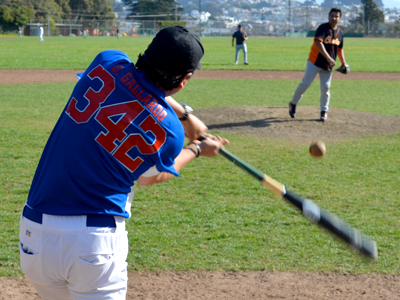
As a new major league baseball season begins this week, another group of players is taking their love of "America's favorite pastime" to fields across the U.S.: indigenous Yucatec Maya immigrants.
In Mexico, the Mayas are a people apart. Half a millennium since Spanish conquistadors set foot in Mesoamerica, their numbers stand in the millions and they remain racially, linguistically and culturally distinct from their non-indigenous countrymen. While most Mexicans are bursting with national pride, Mayas are Yucatecos first (the greatest concentration of Maya are in the Mexican state of Yucatán) and Mexicans second. Most Mexicans speak only Spanish, while most Mayas can speak both Spanish and Maya. And while soccer is practically akin to religion across much of Mexico, for Yucatec Mayas, baseball is life.
 Baseball is so popular among Yucatec Mayas and their love of the sport so unique in their country, that it has become a self-identifier, a point of pride and an integral part of what it means to be Maya -- right up there with poc-chuc (traditional grilled pork), jarana yucateca (traditional dance) and colorful huipiles (traditional clothing).
Baseball is so popular among Yucatec Mayas and their love of the sport so unique in their country, that it has become a self-identifier, a point of pride and an integral part of what it means to be Maya -- right up there with poc-chuc (traditional grilled pork), jarana yucateca (traditional dance) and colorful huipiles (traditional clothing). "Baseball is an important element of Mayan culture," says Alberto Perez, director of Asociación MAYAB, a Bay Area Yucatec Maya organization. It’s a culture that is becoming increasingly visible in the United States, where hundreds of thousands of Mayas now live. Baseball, says Perez, provides a way for Maya immigrants in the U.S. to stay connected with community, display cultural pride and establish their unique place within the Latino Diaspora. “It is almost like an underground movement.” Today, a growing but untold number of Yucateco baseball teams are scattered across the state of California.
In Mexico, Yucateco baseball teams often serve as ambassadors of their pueblito, or small town. Ball fields in Yucatán are like town squares - community social gatherings often revolve around the game. "Many people in Yucatán go every Sunday to the field to be with friends and share the experience," says Gómez. Grabbing the entire family, getting some grilled meat and beer, and heading off to the local ball field is a typical weekend day. “It’s just like an American picnic,” he says.
There are big teams -- the Yucatán Leones play in the highest rung of Mexican professional baseball and have a 13,600-seat stadium - but those are the exception. Attending a Yucateco baseball game is usually an intimate affair, says Gaspar Chi, a Yucateco immigrant to the Bay Area who founded a baseball team here. Many fans who attend games in Yucatán are family members and neighbors that have lived together for generations.
As a result, team loyalties run deep. When teams from the municipalities of Cenotillo and Homún play each other, locals support their players and follow the action as avidly as an American football fan would the NFL.
Yet while other baseball playing countries in the region - most notably the Dominican Republic, current champions of the World Baseball Classic -- churn out Major League Baseball stars like cars from an assembly line, and young boys dream of becoming rich playing in the U.S., Yucatecos are less inclined to view the sport as a way to escape poverty.
Although some players earn as much as $3,000 per week playing in Mexican professional leagues, most who first play ball as children in Oxkutzcab's palm-lined sandlots do so solely because they love the sport. It’s a love that is passed down; every generation endows the next with their skills and techniques.
“It is very beautiful to me,” says Rafael ‘Carmito’ Tep, who has served as the official scorer for a local San Francisco-based team for 15 years. "Even if you are down by five runs late, you can still come back and go ahead." For many Maya immigrants in the U.S., baseball also offers relief from the stress of a long workday. Freddy Cetina, a Bay Aea Yucatec baseball player, says he plays ball to "relax and have fun, to be together with my teammates, my people."
One San Francisco-based league fields six Maya teams and describes itself as being “led by members of the community that feel a strong affinity and commitment for the favorite sport of the contemporary Mayas of Yucatán: baseball.”
Chi has for 12 years been the Manager of Club Yucatán, which plays in another, primarily non-Maya, competitive league where wooden bats are used and pitches reach 70 miles per hour. The team is an ensemble cast, some as young as 20, others much older, but they are all joined by a profound love of bax'abola (bash-ah-bohl-ah), as baseball is called in Maya.
Chi is proud of being a mentor, and sees baseball as a way to unite the local Yucatec community and pass on valuable skills to its members. He makes an effort to speak to his young players in Maya, for example, "to teach them to value themselves as Mayas.”
Similarly, Yucatec baseball teams are beacons of the uniqueness and worth that Maya immigrants bring to the nation, for those that care to look. "Sometimes people value us less because we are Yucatecos." Says Alberto Gómez, "What we are trying to do when we play baseball is to show them that it doesn't matter where you are from, as long as you have fight in you, if you know how to give 100 percent, like Yucatecos do."

